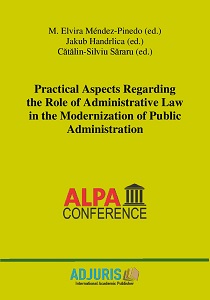The collective negotiation and collective agreements – legal task or opportunity, in the management of the legal service relationships of the police officers
The collective negotiation and collective agreements – legal task or opportunity, in the management of the legal service relationships of the police officers
Author(s): Valentin Minoiu
Subject(s): Public Administration, Public Law
Published by: Societatea de Stiinte Juridice si Administrative
Keywords: collective negotiation; collective agreement; social dialogue; parity commission; service relations;
Summary/Abstract: The issue of collective negotiation will always be of interest from the point of view of the permanent concern of the people employed to maximize the guarantees received from the employer, regardless of whether he is a public or private person, in connection with the satisfaction of economic and social interests, patrimonial or non-patrimonial, which arise from the legal relations between them. Even though, in terms of service legal relationships, in the public sector in general, but also in particular those of police officers, collective negotiation takes on a particular form, much more articulated by rules legally required for organization and conduct, on the merits, but, the importance of this issue determines at least the same concerns. In this context, it has become of interest to study and analyse to what extent, at the level of the public institution involved, in this case the Ministry of Home Affairs, which is entrusted with the overall material competence to manage police officers' relations, to bring together the social partners in a negotiation collective for the conclusion of a collective agreement can be identified and capitalized as an opportunity to obtain benefits also at institutional level, or it remains exclusively the exercise of a legally imposed obligation from which only benefits can be obtained for the policemen and, at the institutional level, at most, the concern to "get" losses or costs as little as possible, implicated in what is offered or accepted in the negotiation.The carried out analysis is based mainly on documentary analysis, which has covered both a part of the existing doctrinal space in the field, the ideological anchoring of the approach in the general landscape of the problem, as well as the normative framework in force in the field, to ensure the legal framing of the resulting conclusions and to size as accurately as possible the proposals formulated and launched for debate or further development.
- Page Range: 216-233
- Page Count: 18
- Publication Year: 2019
- Language: English
- Content File-PDF

